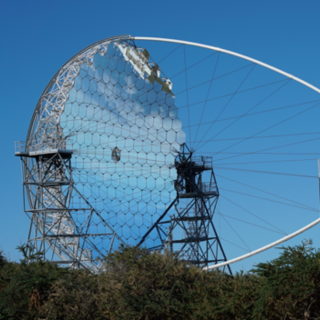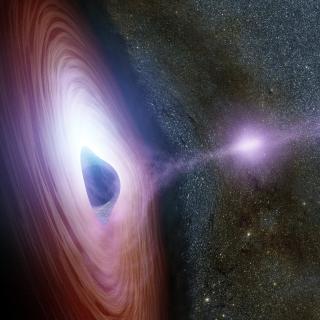Bibcode
MAGIC Collaboration; Ansoldi, S.; Antonelli, L. A.; Arcaro, C.; Baack, D.; Babić, A.; Banerjee, B.; Bangale, P.; Barres de Almeida, U.; Barrio, J. A.; Becerra González, J.; Bednarek, W.; Bernardini, E.; Berse, R. Ch; Berti, A.; Besenrieder, J.; Bhattacharyya, W.; Bigongiari, C.; Biland, A.; Blanch, O.; Bonnoli, G.; Carosi, R.; Ceribella, G.; Chatterjee, A.; Colak, S. M.; Colin, P.; Colombo, E.; Contreras, J. L.; Cortina, J.; Covino, S.; Cumani, P.; D'Elia, V.; da Vela, P.; Dazzi, F.; de Angelis, A.; de Lotto, B.; Delfino, M.; Delgado, J.; di Pierro, F.; Domínguez, A.; Dominis Prester, D.; Dorner, D.; Doro, M.; Einecke, S.; Elsaesser, D.; Fallah Ramazani, V.; Fattorini, A.; Fernández-Barral, A.; Ferrara, G.; Fidalgo, D.; Foffano, L.; Fonseca, M. V.; Font, L.; Fruck, C.; Gallozzi, S.; García López, R. J.; Garczarczyk, M.; Gaug, M.; Giammaria, P.; Godinović, N.; Guberman, D.; Hadasch, D.; Hahn, A.; Hassan, T.; Hayashida, M.; Herrera, J.; Hoang, J.; Hrupec, D.; Inoue, S.; Ishio, K.; Iwamura, Y.; Konno, Y.; Kubo, H.; Kushida, J.; Lamastra, A.; Lelas, D.; Leone, F.; Lindfors, E.; Lombardi, S.; Longo, F.; López, M.; Maggio, C.; Majumdar, P.; Makariev, M.; Maneva, G.; Manganaro, M.; Mannheim, K.; Maraschi, L.; Mariotti, M.; Martínez, M.; Masuda, S.; Mazin, D.; Mielke, K.; Minev, M.; Miranda, J. M.; Mirzoyan, R.; Moralejo, A.; Moreno, V.; Moretti, E.; Neustroev, V. et al.
Referencia bibliográfica
Monthly Notices of the Royal Astronomical Society, Volume 480, Issue 1, p.879-892
Fecha de publicación:
10
2018
Número de citas
18
Número de citas referidas
17
Descripción
The Major Atmospheric Gamma-ray Imaging Cherenkov (MAGIC) telescopes
observed S2 0109+22 in 2015 July during its flaring activity in
high-energy gamma-rays observed by Fermi-Large Area Telescope. We
analyse the MAGIC data to characterize the very high energy (VHE)
gamma-ray emission of S2 0109+22, which belongs to the subclass of
intermediate synchrotron peak (ISP) BL Lacertae (BL Lac) objects. We
study the multifrequency emission in order to investigate the source
classification. Finally, we compare the source long-term behaviour to
other VHE gamma-ray emitting (TeV) blazars. We performed a temporal and
spectral analysis of the data centred around the MAGIC interval of
observation (MJD 57225-57231). Long-term radio and optical data have
also been investigated using the discrete correlation function. The
redshift of the source is estimated through optical host-galaxy imaging
and also using the amount of VHE gamma-ray absorption. The
quasi-simultaneous multifrequency spectral energy distribution (SED) is
modelled with the conventional one-zone synchrotron self-Compton (SSC)
model. MAGIC observations resulted in the detection of the source at a
significance level of 5.3σ. The VHE gamma-ray emission of S2
0109+22 is variable on a daily time scale. VHE gamma-ray luminosity of
the source is lower than the average of TeV BL Lacs. The optical
polarization and long-term optical/radio behaviour of the source are
different from the general population of TeV blazars. All these findings
agree with the classification of the source as an ISP BL Lac object. We
estimate the source redshift as z = 0.36 ± 0.07. The SSC
parameters describing the SED are rather typical for blazars.
Proyectos relacionados

Astrofísica de Partículas
El Grupo de Astrofísica de Partículas del IAC participa activamente en tres grandes colaboraciones internacionales de astrofísica de muy altas energías: AMS-02 (Alpha Magnetic Spectrometer), los telescopios de radiación Cherenkov MAGIC I y II y el Cherenkov Telescope Array Observatory ( CTAO). Además, participamos en el ASTRI mini-array, el
Mónica Luisa
Vázquez Acosta

Variabilidad en Núcleos Activos de Galaxias: Estudios Multifrecuencia
Los núcleos activos de galaxias (AGN por sus siglas en inglés) se caracterizan por una potente emisión proveniente de una región muy compacta (sólo pocos pcs) en el centro de la galaxia. Los "blazars" son una categoría de AGNs, caracterizados por mostrar una alta luminosidad en un amplio rango de frecuencia, desde radio a altas energías (rayos X y
José Antonio
Acosta Pulido